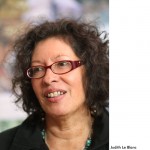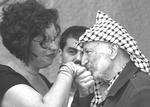The US “peace movement” can take at least part of the credit for the Obama Administration’s proposed cuts in defense spending.
For years the movement has campaigned to end every US war, dump every possible weapons system, close all US bases abroad and divert US military spending to domestic social programs.

Judith LeBlanc
One of the key leaders of the US peace movement in recent years has been Judith LeBlanc.
A member of the Caddo American Indian tribe of Oklahoma, LeBlanc is national field organizer for Peace Action, the country’s largest grassroots peace organization with 100,000 members across the country. She is also formerly the national co-chair of the peace umbrella group United for Peace and Justice, with Leslie Cagan, who was then a leader of the Marxist Committees of Correspondence for Democracy and Socialism.
LeBlanc herself is also a Marxist, first joining the Communist Party USA in 1974.
Le Blanc is one of the vice-chairs of the Communist Party and chairs it’s Peace and Solidarity Commission, the body charged with directing the US “peace movement.” Leblanc was formerly a reporter for the People’s Weekly World, forerunner of the People’s World. She has written extensively on her travels to Japan, Palestine, Israel, Lebanon, Australia and elsewhere and was an eyewitness reporter on the 9-11 attacks and their aftermath in New York City.
In 2002, Judith LeBlanc traveled twice to the Middle East. The first trip was an assignment to Israel, the West Bank and Gaza in May to report on the struggle to end the Israeli occupation. During that trip she met with infamous Palestinian terrorist leader Yasser Arafat.
On October 10-12 of that year, she attended the Communist Party of Israel’s Congress. While there she tracked the “crisis in the region in light of the Bush administration’s drive to go to war with Iraq.

Judith LeBlanc, Yasser Arafat, 2002
LeBlanc has worked closely with the powerful Japanese and British “peace movements.”
Here, LeBlanc addresses a circa 2008 British anti-nuclear rally.
In 2009, Judith LeBlanc toured Australia as a guest of the Communist Party of Australia and Party led Australian Anti-Bases Campaign Coalition to take part in the protests against the Talisman Sabre joint US-Australian military exercises which were taking place at Shoalwater Bay near Rockhampton from July 6-26. While in Sydney on her way to Rockhampton, LeBlanc was interviewed by Anna Pha of the CPA.
AP: Judith, could you please tell us about United for Peace and Justice?
Judith LeBlanc: United for Peace and Justice grew out of the struggle to prevent the war in Iraq and it was the coming together of the traditional peace and disarmament groups nationally and a range of local peace and justice centres and coalitions and new grass roots groups that emerged in this struggle to prevent the war. It began with 300 organisations and has grown to 1,400 member groups.
Now we are in the midst of retooling the peace movement, so to speak, and finding new ways to involve people in ending the war in Afghanistan and to build a bridge to that longer-term movement that is needed to end US militarisation and the militarisation of our domestic budget.
AP: What is the attitude to those wars in the US?
JLB: I think the peace movement scored an incredible victory with the election of Barack Obama and him keeping his pledge that he would set a deadline, a timetable for US withdrawal from Iraq. Of course the timetable that has been set by the new administration is not all that we would like. But you never win a total victory, you always win part and you continue to struggle.
We feel that in many ways our work to end the war and the occupation in Afghanistan is starting from a sound basis. Majority opinion opposed the [Iraq] war and that was mobilised and galvanised into support for the defeat of McCain.
Now we are trying to take that movement that rose in support of the Obama election and the majority opposition to the war in Iraq into a new national dialogue of the history and the impact of the war and the occupation of Afghanistan…
So now we are operating in a new environment, in a new political space in which perhaps we will have great success in helping people understand that you cannot solve issues around national security with war. That the mere presence of the US military in countries such as Iraq and Afghanistan gives rise to insurgency. So we want to help the American people to begin pressing Congress and the Obama administration to step back and to tell us what is the exit plan…
So, the movement for peace, the social movements in our country, are they ready to fill the political space that the election of Obama has created? Not quite, but I think the peace movement has enough experience in the six years of the struggle to end the Iraq war to know that it is going to take a strong, well organised, vocal peace movement to make the changes that are needed.
AP: So far, how do you assess Obama’s foreign policy?
JLB: I think the Obama administration has made headway changing foreign policy. It has spoken about the differences it wants to make in its relationship to Cuba, in its role in pressing for a just Middle East peace between Palestine and Israel, in its relationship to the Muslim world. But the truth is that in order for those words to become a reality we need a stronger peace movement and we need one that can advocate forcefully and in a meaningful way the direct interconnectedness between peace and justice, between domestic policy and foreign policy…
Obama’s voting record in the Senate was, and he has maintained this position after becoming president, that there is a need to reduce nuclear arms, that there was a need for ratification of the Comprehensive Test Ban Treaty. He is making good on that promise by initiating talks with Russia to cut nuclear armaments. We are hoping, as he said in a speech in Prague recently, that it is not only the moral responsibility of the US to cut nuclear arms but it is a necessity to move towards the abolition of nuclear weapons.
The struggle for nuclear disarmament and the abolition of nuclear weapons is a critical issue for the peace movement to regroup and to retool and for building a mass movement around. We had a very strong and vibrant movement around nuclear disarmament in the ’80s.
We hope to take Obama’s words [on nuclear disarmament] and build a movement that calls for abolition in our lifetimes. We are busy at work planning with our international partners a year-long national petition drive to call on Obama to abolish nuclear weapons.
We are launching it on the anniversary of the bombings of Hiroshima and Nagasaki and concluding this petition drive at the time of the May 2010 Nuclear Non-Proliferation Treaty Conference at the United Nations. We hope to apply such mass pressure on the Obama administration that they will take rapid steps to not only sign the joint agreement with Russia to reduce nuclear warheads but also to end the testing of new nuclear weapons and to begin to ratify the Comprehensive Test Ban Treaty in Congress and take giant steps forward before that 2010 Non-Proliferation Treaty conference.
We are very hopeful that we can build that mass movement because people understand the nature of war in a different way because of Iraq and because of what’s going on in Afghanistan. They also know that the Obama administration is not the agent of change but can be the vehicle for change. We think that nuclear weapons is a good starting point.
Here, circa late 2008, LeBlanc lays out the Communist Party/peace movement’s hope for change under their “friend” Barack Obama.
Judith LeBlanc and the Communist Party USA can take a big part of the credit for America’s likely decision to slash defense spending, through their control of the US “peace movement” and their influence inside the eighty strong Congressional Progressive Caucus.
All this on the verge of a possible worldwide economic meltdown and international instability not seen since WW2!
The Communist party USA is allied with China, Cuba, Venezuela and North Korea, and the communist parties of Russia, Palestine and Iraq – all of whom have a strong interest in reduced American military power.
The Communist Party USA and the US “peace movement” are “5th columnists” for the enemies of America.
Though they will deny it, the facts speak for themselves.
.
Trevor Loudon, top researcher of the global neo-Marxist movement, administrates KeyWiki and NewZeal.
Mr. Loudon’s Obama Files articles are also listed at NewZeal.








Speak Your Mind
You must be logged in to post a comment.